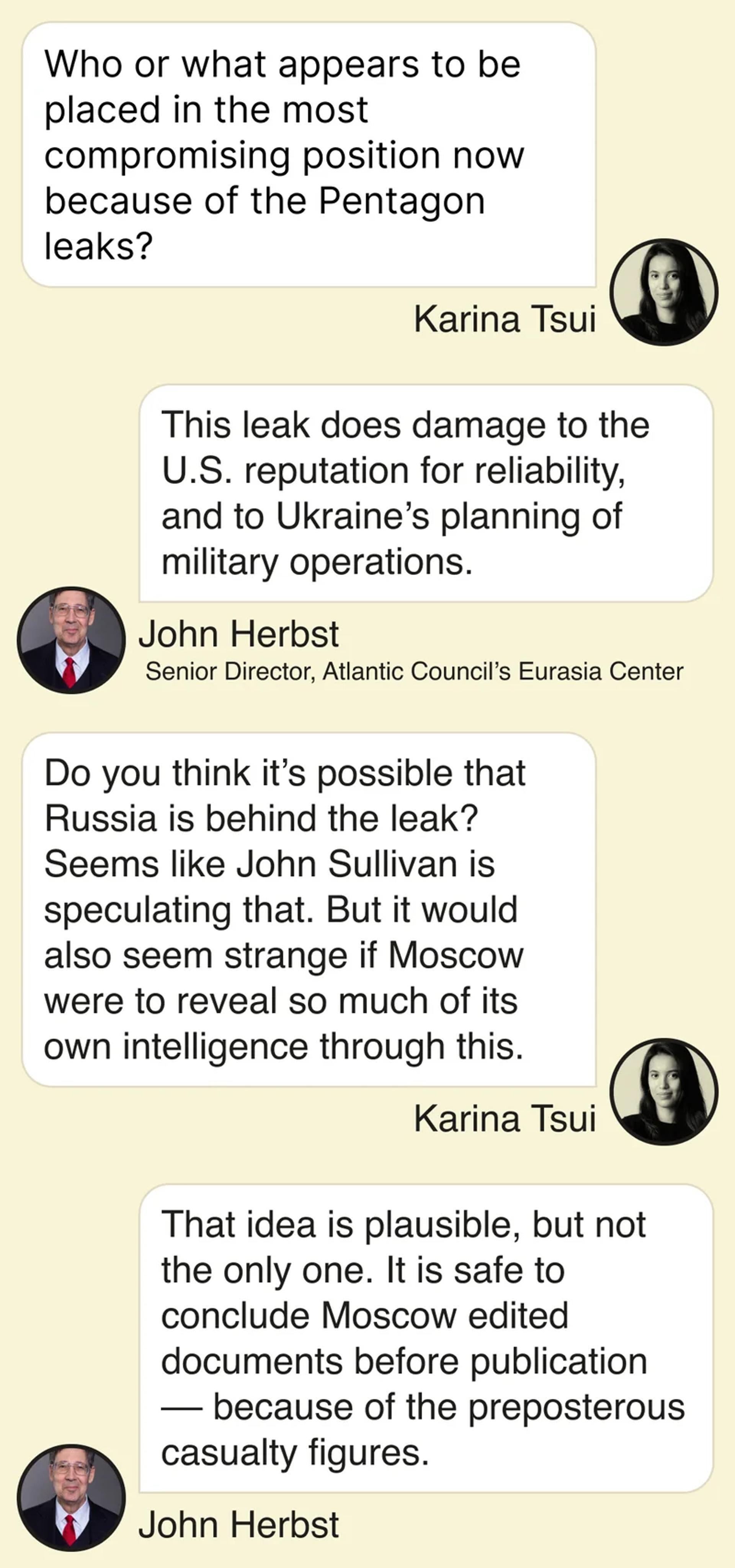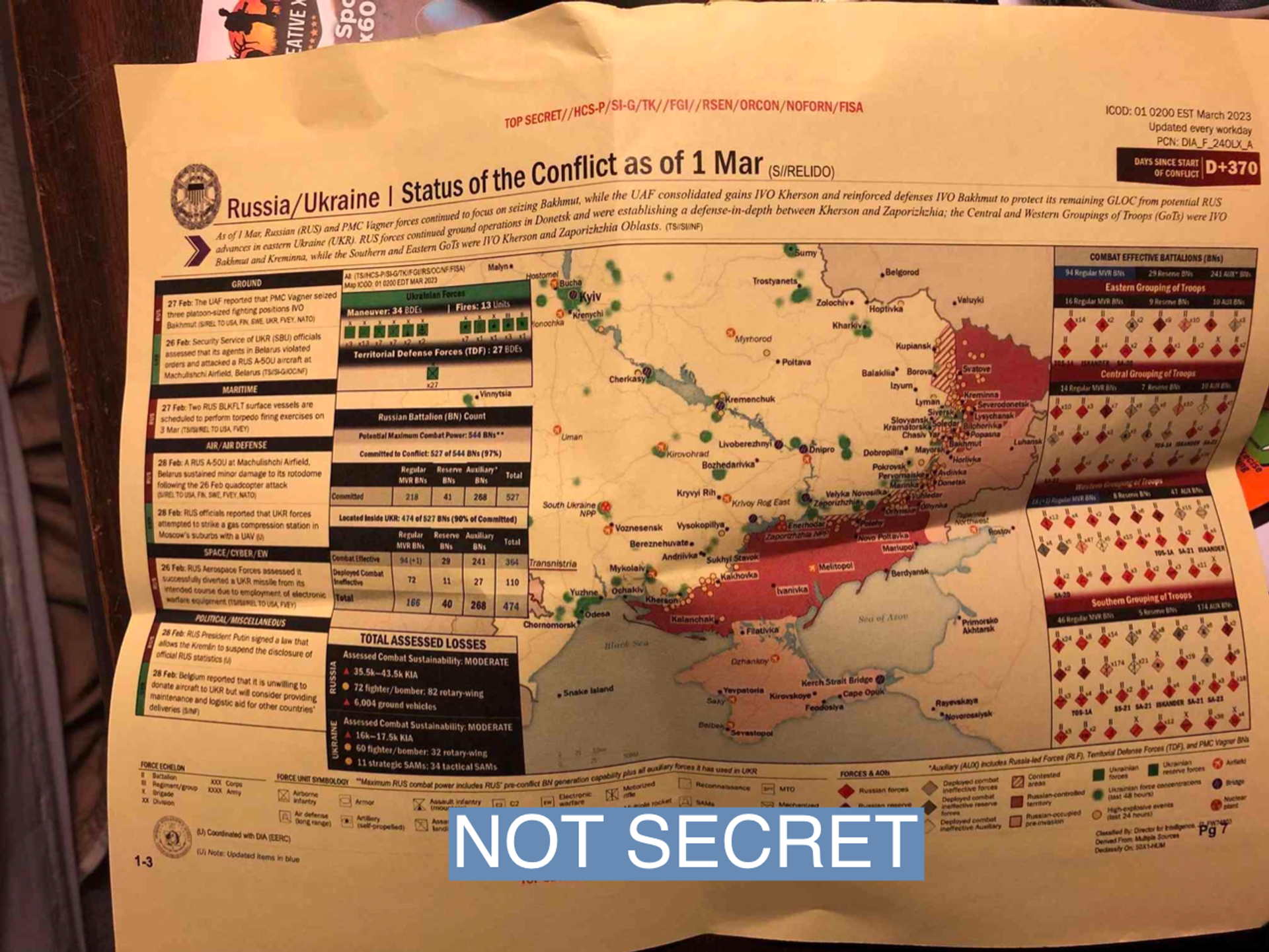The News
A major leak of classified Pentagon documents is giving the world a window into the United States’ prolific spying efforts related to the war in Ukraine, and sparking fears that American intelligence sources could end up compromised. Here’s what is know so far.
What are in the documents?
The trove of leaked Pentagon documents contains details of closed-door briefings, eavesdropping, and summaries of American espionage –– how Washington is not only spying on its enemies but its allies too –– including top military and political leaders in South Korea and Ukraine.
According to the Washington Post, the documents were most likely prepared for the chairman of the Joint Chiefs of Staff Gen. Mark A. Milley this past winter, but other people with requisite security clearances also had access.
Multiple outlets have reviewed roughly half of the 100-page leak and say that the papers reveal highly sensitive military secrets –– from Israel’s plans to provide lethal aid to Ukraine, to Kyiv’s shortage of air defense supplies, to the type of satellite imagery the U.S. used to track Russia’s military, and how Wagner, Russia’s paramilitary group, attempted to purchase weapons from Turkey, a NATO ally, to use against Ukraine. It’s unclear whether these discussions led anywhere.
The pages — which contain intelligence from the National Security Agency, the State Department’s Bureau of Intelligence and Research, and the CIA — also show the extent to which the U.S. has penetrated nearly all of Russia’s security services, gathering enough information to warn Kyiv about the precise timings and locations of Moscow’s attacks. Some analysts fear that the leaked details will prompt Russia to shut down sources of information the U.S. has access to.
When were the documents leaked?
According to investigative outlet Bellingcat, the first documents appeared in early March on Discord servers dedicated to the video game Minecraft and a Filipino YouTuber. More secret documents then spread to 4Chan, Telegram, and Twitter.
Bellingcat also interviewed Discord users who reportedly saw papers in a similar style on a now-defunct forum called Thug Shaker in January, which attracted people “interested in video games, music, Orthodox Christianity, and fandom for the popular YouTuber ’Oxide.’” However, the outlet wasn’t able to independently verify their claims.
Is all the information real?
There are reportedly two different versions of the leaked documents circulating online –– one of which has been altered to downplay the number of Russian casualties and amplify the number of Ukrainians killed in the war. U.S. officials have estimated that around 200,000 Russian soldiers have been killed or injured and that there have been roughly 100,000 Ukrainian casualties.
In a statement on Telegram, Mykhailo Podolyak, an adviser to Ukrainian president Volodymyr Zelenskyy, said that dozens of documents were fake or “altered,” without providing more details, adding that the leak was likely intended to sow divisions between allies.
Pentagon officials who’ve seen the documents say that most of the material appears to be legitimate, but some may be slightly altered.
Who are the suspects behind the leak?
It is unclear at this point, but in an interview with NBC, U.S. Ambassador to Russia John Sullivan said that the alterations in some of the documents indicate that “this may be a Russian disinformation campaign.”
The Department of Justice has opened a criminal investigation into the leak.
What are the national security implications?
The scale of the leak would likely undermine the trust allies and partners like Ukraine have in the U.S., experts say, and could also provide sensitive information to Russian adversaries.
The View From John Herbst
John Herbst is the senior director of the Atlantic Council’s Eurasia Center and the former U.S. ambassador to Ukraine.

